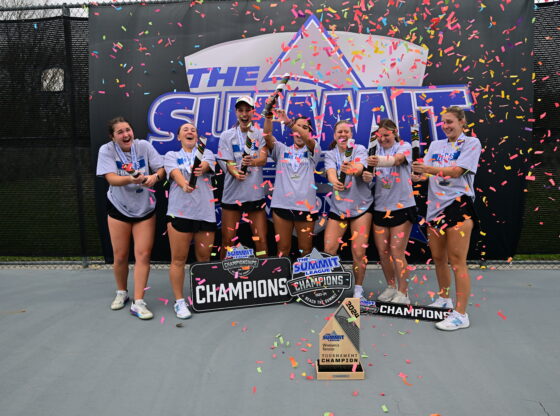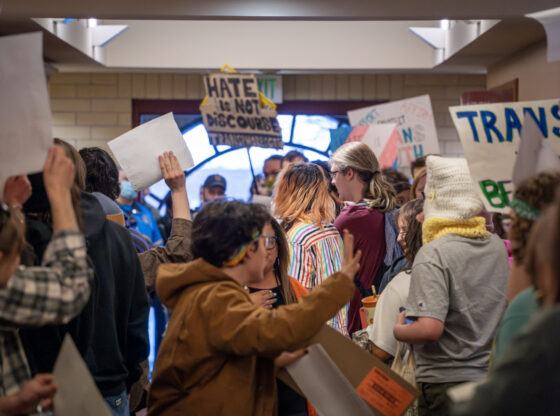“Our active partnerships with local and global communities contribute to a sustainable common good.”
—University of Denver Mission Statement
Opened in 2021, the new Community Commons is now a fixture of student life at the University of Denver. The commons boasts student affinity group offices, shiny copper shingles and shamelessly overpriced smoothie bowls. But one topic no one is talking about is how DU’s new student center was actually built.
Colorado Department of Labor and Employment (CDLE) documentation provided by Carpenters/Contractors Cooperation Committee Special Representative Gustavo Maldonado shows that at least ten Interior Contractors Inc. (ICI) employees who worked on the DU Community Commons and Dimond Family Residential Village construction projects later filed complaints of labor violations with CDLE.
Complaints at DU worksites included lack of overtime pay, sick pay and vacation pay, failure to pay workers for all hours worked, weekly deductions of “checking fees” from cash payments, meal break violations, unjust termination and failure to pay city and state taxes.
Among the nine complaints of wage theft, the average reported loss was $11,812. Five workers also reported the deduction of $15 “checking fees” from weekly pay even though they were paid in cash. One worker said he was fired after asking labor broker Isaac Gonzalez about COVID-19 benefits available to ICI employees.
DU Vice Chancellor for Facilities Management and Planning Allan Wilson denied that any labor violations occurred on the project.
“A labor violation would have shut the construction site down,” he said, “and we didn’t have any record of any of that.”
Interior Contractors Inc. (ICI) is an interior construction firm based in Arvada, Colo. Employed by Saunders Construction to handle interior work on the Community Commons and Dimond projects, ICI in turn used third-party labor brokers Top Notch Drywall, headed by Gonzalez, and FGP Partners, run by Fernando Marta, to hire drywall and framing workers. Maldonado and Southwest Regional Council of Carpenters (SRCC) representative Dan Ridgeway said many of these workers were consistently shorted pay and lacked formal employment documentation.
“They pay [the workers] less, or they don’t pay them overtime, they can short them hours, they can ask them to do dangerous stuff and they have no recourse to [refuse],” said Ridgeway.
At least 33 workers filed formal wage and hour complaints against ICI at worksites across Colorado between 2018 and 2020, claiming an average of $8,637 in stolen wages. The CDLE opened an investigation into the company in November 2020 for misclassification of employees as independent contractors, failure to pay all earned wages to employees, and failure to provide employees with pay statements and notice of their rights.
ICI Vice President Dave Webster declined to comment on the labor department’s open investigation into ICI and on the allegations accusing the company of wage fraud.
DU officials have yet to publicly address these reports.
National and state labor protections
Under the Fair Labor Standards Act (FLSA), any employer whose annual revenue exceeds $500,000 or who does business in multiple states is required to pay employees overtime (1.5 times the base rate) for any hours worked beyond 40 per work week. Colorado state law requires a 30-minute lunch break for over five hours of consecutive work and one compensated 10-minute break for every four hours of consecutive work.
In letters responding to demands for wages, ICI claimed that any workers hired through labor brokers were independent contractors and, as such, did not qualify for these protections. However, workers who demanded wages from ICI also reported that their schedules and day-to-day activities were dictated by ICI staff.
To be correctly classified as an independent contractor, a worker must control how they complete their work. If the payer dictates how the work, including scheduling, payment and the job itself, is done, then the worker qualifies as an employee and is protected by state and national labor law.
While labor law applies to employees regardless of their legal status, Maldonado noted that lack of legal residency enables employers to easily violate the rights of undocumented workers.
“Everybody’s legal; they only work 40 hours,” he said. “Everybody’s illegal; they work 60 hours because [the employers] don’t pay overtime.”
According to the Colorado Fiscal Institute’s 2022 report, over 400,000 Coloradoans experience wage theft each year, losing a total of over $720 million to wage theft annually. The Institute also found that immigrants, people of color, low-income workers and women are the most likely to experience wage theft and that the hospitality, retail and construction industries face the highest rates of wage theft in the state.
Is DU responsible for subcontractor behavior?
The university signed general contractor Saunders Construction to manage the construction of the Community Commons and Dimond beginning in 2019. The commons officially opened in Jan. 2021.
The general contractor selects subcontractors to handle specific aspects of construction, screening for effectiveness, quality and value to decide who to bring onto the project. Subcontractors can then hire labor brokers to bring on workers for specific projects. These workers are often hired informally and are at high risk of wage theft.
“Very often, bigger, more powerful companies will hide behind labor brokers, staffing agencies and other intermediaries to insulate themselves from liability,” said David Seligman, who is the Executive Director of the legal advocacy organization Towards Justice.
The use of multiple intermediaries is often referred to as “workplace fissuring” and occurs across the construction, food, and hospitality industries.
Seligman pointed to “up-the-chain liability” as a way of holding larger companies accountable even if they don’t employ workers directly. Enacted in Denver at the beginning of 2023 as a part of the City Council’s Wage Theft Ordinance, this mechanism would hold institutions legally accountable for violations on any projects under their control.
Wilson acknowledged that the university does not screen subcontractors or general contractors for their compliance with labor law. “We’re delivering on time and on budget,” he said. “That’s our biggest interest.”
To JoyAnn Ruscha, who served as Political Affairs Specialist at SRCC, this was an obvious oversight.
“If we know that this is a problem in this industry… [large institutions] should have that kind of compliance monitoring in place in the beginning,” she said. “It should be well known to whoever is putting the bids on these projects that those contractors and the subcontractors underneath them will be held responsible if they violate the law.”
Contacting the university
Maldonado informed Ridgeway of the complaints in early 2020; Ridgeway then contacted the university, first writing a letter to Chancellor Jeremy Haefner and then calling administrators directly in March.
In an email, the Chancellor said he was “not aware of any violations involving the subcontractors hired for these projects.”
Ridgeway eventually got in touch with former Vice Chancellor for Facilities Management and Planning James Rosner. Ridgeway said he informed Rosner on March 26 that workers had reported wage theft, kickbacks and lack of adequate workers compensation while working on the Community Commons. He called the exchange “solicitous.”
When Ridgeway called back a week later, he said he received a very different response.
“[Rosner] had a completely different tone,” Ridgeway said. “He was totally mad, he’s saying ‘I don’t answer to you,’ and ‘don’t bother me again.’”
Rosner left the university in 2021 and said in an email that he was unable to “provide the accurate and detailed comment necessary for [the author’s] inquiry.” He went on to say he was “not able to provide a general comment either as I would need to reference the project documents.”
Rosner declined to comment on whether he was contacted by Ridgeway.
Speaking on the reported violations, Wilson, Rosner’s successor, said “that would have been the general contractor’s responsibility to fix, we don’t employ the subcontractors.” While the university typically does not participate in subcontractor selection, it can prevent specific subcontractors from bidding if it has been dissatisfied with that subcontractor’s past work.
Enforcing labor law in Denver
Although DU did not pay ICI workers directly, their lack of oversight on subcontractor labor practices stands in contrast to the school’s community-oriented values. After all, DU’s website boasts of its “deep roots” in Denver and of “working closely with surrounding communities to solve problems together.”
Denver has taken some steps to address wage theft. The 2023 city ordinance established a pathway for criminal prosecution and, alongside the Colorado General Assembly’s HB 19-1267, increased penalties for wage theft for employers. The Denver City Attorney’s Office has also opened a wage theft unit to investigate specific claims.
While these measures provide gains on the legal front, labor law enforcement still has a ways to go. Maldonado pointed out that the city and CDLE’s reporting process is difficult for many workers to navigate. The questionnaires required by CDLE are repetitive and confusing, he said, and many workers don’t have time to spend hours giving affidavits. But most of all, Maldonado is losing faith in the labor department’s ability to execute.
“In other states, after six or seven months, depends on the case, they’re done. Here, the case is already three years,” he said, shaking his head. “What happened? A lot of people think it’s political.”
Building up enforcement infrastructure would require more funding at the city and state level; it would also force Coloradans to reckon with the fact that many companies they patronize are not paying their workers fairly. To Ruscha, taking these steps rides on political will.
“This country was built on the backs of stolen labor,” Ruscha said. “That it still occurs on this level in the United States is a policy choice.”











